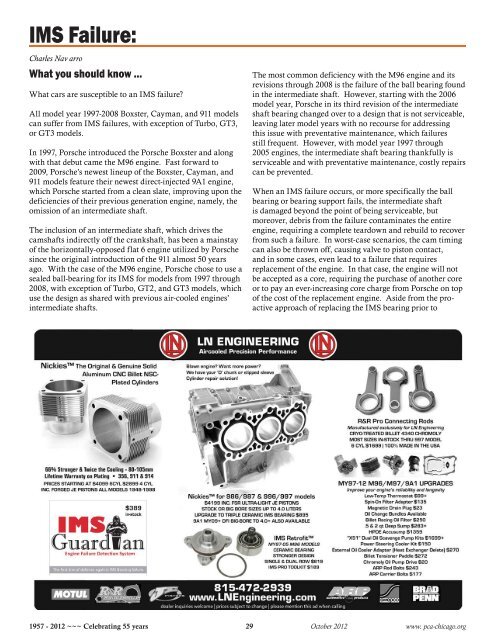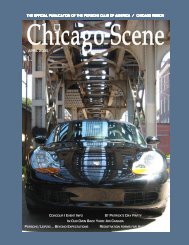PDF Download - Porsche Club of America - Chicago Region
PDF Download - Porsche Club of America - Chicago Region
PDF Download - Porsche Club of America - Chicago Region
You also want an ePaper? Increase the reach of your titles
YUMPU automatically turns print PDFs into web optimized ePapers that Google loves.
IMS Failure:<br />
Charles Nav arro<br />
What you should know …<br />
What cars are susceptible to an IMS failure?<br />
All model year 1997-2008 Boxster, Cayman, and 911 models<br />
can suffer from IMS failures, with exception <strong>of</strong> Turbo, GT3,<br />
or GT3 models.<br />
In 1997, <strong>Porsche</strong> introduced the <strong>Porsche</strong> Boxster and along<br />
with that debut came the M96 engine. Fast forward to<br />
2009, <strong>Porsche</strong>’s newest lineup <strong>of</strong> the Boxster, Cayman, and<br />
911 models feature their newest direct-injected 9A1 engine,<br />
which <strong>Porsche</strong> started from a clean slate, improving upon the<br />
deficiencies <strong>of</strong> their previous generation engine, namely, the<br />
omission <strong>of</strong> an intermediate shaft.<br />
The inclusion <strong>of</strong> an intermediate shaft, which drives the<br />
camshafts indirectly <strong>of</strong>f the crankshaft, has been a mainstay<br />
<strong>of</strong> the horizontally-opposed flat 6 engine utilized by <strong>Porsche</strong><br />
since the original introduction <strong>of</strong> the 911 almost 50 years<br />
ago. With the case <strong>of</strong> the M96 engine, <strong>Porsche</strong> chose to use a<br />
sealed ball-bearing for its IMS for models from 1997 through<br />
2008, with exception <strong>of</strong> Turbo, GT2, and GT3 models, which<br />
use the design as shared with previous air-cooled engines’<br />
intermediate shafts.<br />
The most common deficiency with the M96 engine and its<br />
revisions through 2008 is the failure <strong>of</strong> the ball bearing found<br />
in the intermediate shaft. However, starting with the 2006<br />
model year, <strong>Porsche</strong> in its third revision <strong>of</strong> the intermediate<br />
shaft bearing changed over to a design that is not serviceable,<br />
leaving later model years with no recourse for addressing<br />
this issue with preventative maintenance, which failures<br />
still frequent. However, with model year 1997 through<br />
2005 engines, the intermediate shaft bearing thankfully is<br />
serviceable and with preventative maintenance, costly repairs<br />
can be prevented.<br />
When an IMS failure occurs, or more specifically the ball<br />
bearing or bearing support fails, the intermediate shaft<br />
is damaged beyond the point <strong>of</strong> being serviceable, but<br />
moreover, debris from the failure contaminates the entire<br />
engine, requiring a complete teardown and rebuild to recover<br />
from such a failure. In worst-case scenarios, the cam timing<br />
can also be thrown <strong>of</strong>f, causing valve to piston contact,<br />
and in some cases, even lead to a failure that requires<br />
replacement <strong>of</strong> the engine. In that case, the engine will not<br />
be accepted as a core, requiring the purchase <strong>of</strong> another core<br />
or to pay an ever-increasing core charge from <strong>Porsche</strong> on top<br />
<strong>of</strong> the cost <strong>of</strong> the replacement engine. Aside from the proactive<br />
approach <strong>of</strong> replacing the IMS bearing prior to<br />
1957 - 2012 ~~~ Celebrating 55 years 29 October 2012<br />
www. pca-chicago.org
















